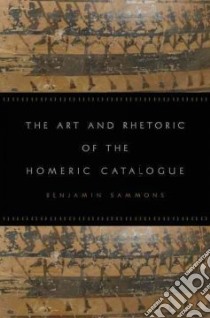The Art and Rhetoric of the Homeric Catalogue - 9780195375688
Un libro in lingua di Benjamin Sammons edito da Oxford University Press, 2010
- € 111.60
- Il prezzo è variabile in funzione del cambio della valuta d’origine
"Sammons explodes the casual reader's prejudice against Homeric catalogues as boring bits one can safely skip over. In this subtle, precise, and inventive reading of the wonderfully various ways in which Homeric poetry makes use of the catalogue device, he demonstrates how its epic deployment is a self-conscious, artistically satisfying form of discourse, one that allows the composer to give depth and overtone to important scenes and to highlight character traits. In short, Sammons has managed to construct the first really sophisticated poetics and rhetoric of lists."---Richard Martin, Stanford University
"Sammons' The Art and Rhetoric of the Homeric Catalogue offers a series of probing, sensitive, and thoughtful readings of the individual catalogues within the Homeric poems. These readings demonstrate tensions between narrative and catalogue: catalogue implies mastery of information, but narrative shows that complete knowledge is impossible. The book is at once bold and careful, a work of thorough but fully accessible scholarship."---Ruth Scodel, University of Michigan
In the Art and Rhetoric of the Homeric Catalogue, Benjamin Sammons takes a fresh look at a familiar element of the Homeric epics---the poetic catalogue. This study uncovers the great variety of functions fulfilled by catalogue as a manner of speech within very different contexts, ranging from celebrated examples such as the poet's famous "Catalogue of Ships," to others less commonly treated under this rubric, such as catalogues within the speech and rhetoric of Homer's characters. Sammons shows that catalogue poetry is no ossified or primitive relic of the old tradition, but a living subgenre of poetry that is deployed by Homer in a creative and original way. He finds that the catalogue form may be exploited by the poet or his characters to reflect---or distort---the themes of the poem as a whole, to impose an interpretation on events as they unfold, and possibly to allude to competing poetic traditions or even contemporaneous poems. Throughout, the study focuses on how Homer uses his catalogues to talk about the epic genre itself: As a compendious and venerable form, catalogue poetry allows the poet to explore the boundaries of the heroic world, the limits of heroic glory, and the ideals and realities of his own traditional role as an epic bard. Building on a renewed interest in the "literary list" in other disciplines, Sammons shows that Homer is not only one of the earliest known practitioners of the poetic catalogue, but one of the subtlest and most skillful.
Informazioni bibliografiche
- Titolo del Libro in lingua: The Art and Rhetoric of the Homeric Catalogue
- Lingua: English
- Autore: Benjamin Sammons
- Editore: Oxford University Press
- Collana: Oxford Univ Pr (Hardcover)
- Data di Pubblicazione: 11 Giugno '10
- Genere: LITERARY COLLECTIONS
- Argomenti : Epic poetry, Greek History and criticism
- Pagine: 233
- ISBN-10: 0195375688
- EAN-13: 9780195375688


